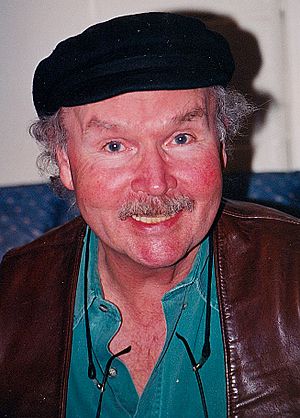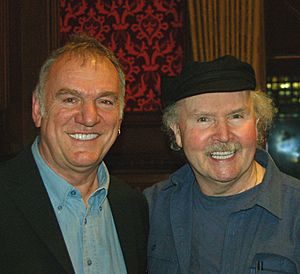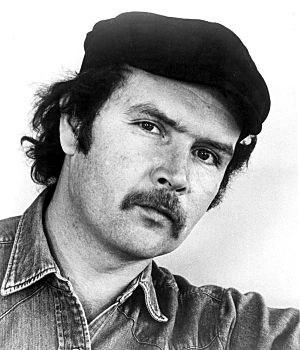Tom Paxton facts for kids
Quick facts for kids
Tom Paxton
|
|
|---|---|

Paxton in 2000 (Washington, D.C.)
|
|
| Background information | |
| Birth name | Thomas Richard Paxton |
| Born | October 31, 1937 Chicago, Illinois, U.S. |
| Genres | Folk |
| Occupation(s) | Singer-songwriter, guitarist |
| Instruments | Guitar, vocals |
| Years active | 1962–present |
| Labels | |
Thomas Richard Paxton (born October 31, 1937) is an American folk singer and songwriter. He has been making music for over sixty years! In 2009, Tom Paxton received a special Grammy Lifetime Achievement Award. This award celebrates artists who have made a big impact on music over many years.
Paxton's songs are very popular and have been recorded by many famous musicians. Some of his well-known songs include "The Last Thing on My Mind", "Bottle of Wine", and "The Marvelous Toy". Artists like Pete Seeger, Bob Dylan, Judy Collins, and John Denver have all sung his songs. Even Dolly Parton and Willie Nelson have recorded his music!
Contents
Growing Up: Tom Paxton's Early Life
Tom Paxton was born on October 31, 1937, in Chicago, Illinois. His parents were Burt and Esther Paxton. When he was young, his family moved to Wickenburg, Arizona. There, he learned to ride horses and first discovered folk music. He enjoyed the songs of artists like Burl Ives.
In 1948, his family moved to Bristow, Oklahoma. Tom considers this town his home. When he was about 15, he got his first musical instrument, a ukulele. A year later, his aunt gave him a guitar. He started to really get into the music of Burl Ives and Harry Belafonte.
In 1955, Tom went to the University of Oklahoma to study drama. This is where he found other people who loved folk music. He learned about the music of Woody Guthrie and the Weavers. Tom said that Woody Guthrie was a big influence because he was brave and sang about important issues. In college, Tom was part of a group called the Travellers. They sang at a local coffeehouse.
Tom Paxton's Music Career Begins
After college in 1959, Tom Paxton tried acting and went to graduate school for a short time. Then, he joined the United States Army. While in the Army, he started writing songs on his typewriter. On weekends, he often visited Greenwich Village in New York City. This area was a hub for the growing folk music scene in the early 1960s.
After leaving the Army, Tom tried out for a group called the Chad Mitchell Trio. He didn't quite fit with their voices. However, he sang his song "The Marvelous Toy" for a music publisher named Milt Okun. Okun was so impressed that Tom became the first songwriter signed to his company, Cherry Lane Music Publishing.
Tom soon started performing at The Gaslight Cafe in Greenwich Village. He became a regular performer there. In 1962, he recorded a live album at the Gaslight called I'm the Man That Built the Bridges. During this time, he also published some of his songs in folk magazines. He performed with other folk singers like Bob Dylan and Pete Seeger. In January 1963, Tom met his future wife, Margaret Ann Cummings, known as "Midge," at the Gaslight.
Making a Name in Folk Music
Pete Seeger began singing some of Tom's songs in 1963. These included "Ramblin' Boy" and "What Did You Learn in School Today?". Tom's popularity grew, and he performed at the 1963 Newport Folk Festival. A month later, he married Midge. He started traveling to perform in coffeehouses and small venues.
Tom Paxton also became involved in important causes. He supported human rights, civil rights, and labor rights. In 1963, he and other folk musicians performed for striking coal miners in Hazard, Kentucky.
In 1964, Tom signed with Elektra Records, a well-known folk music label. He recorded seven albums with them. As folk music became more popular, Tom got more opportunities to perform. He played benefit concerts and visited college campuses. In 1964, he took part in Freedom Summer. He traveled to the Deep South with other folk musicians. They performed at events to help people register to vote and at rallies for civil rights.
Tom wrote his civil rights song "Beau John" after a workshop in Atlanta, Georgia. He also wrote "Goodman, Schwerner and Chaney" about the murders of three civil rights activists in 1964. His songs became more and more recognized in folk music and other types of music.
Paxton's Songs Reach More People
In 1965, Tom Paxton went on his first tour of the United Kingdom. He has continued to perform there almost every year since. He worked with Bruce Woodley from the Australian folk group The Seekers. They wrote the song "Angeline (Is Always Friday)" together.
In 1967, Porter Wagoner and Dolly Parton's recording of "The Last Thing on My Mind" became a top ten country hit. In 1968, The Fireballs had a Top 10 radio hit with Tom's song "Bottle of Wine". Tom even licensed one of his songs, "My Dog's Bigger than Your Dog," for a dog food commercial!
Even with this success, Tom kept writing and performing. He preferred his folk singer-songwriter style. He didn't want to change his music to fit the "folk rock" trend. He released albums like Outward Bound (1966) and Morning Again (1968). In 1968, he performed at a concert honoring Woody Guthrie.
Tom experimented with adding more instruments to his recordings, like strings and horns. His album The Things I Notice Now (1969) and Tom Paxton 6 (1970) even appeared on the pop charts. His song "Whose Garden Was This" was an environmental song written for the first Earth Day. John Denver later recorded it.
However, Tom soon decided he preferred his original acoustic style. He felt the music was becoming too "overproduced." He said, "the acoustic guitar has always been what I loved the most." He wanted his albums to sound more like his natural, traditional style again.
Later Years and Continued Music
Tom, his wife Midge, and their two daughters lived in London for about four years in the early 1970s. They also toured New Zealand and China. Tom released How Come the Sun in 1971. He later moved back to New York City and then to the Washington, D.C., area.
In 1977, he recorded a live album with Steve Goodman called New Songs From the Briarpatch. This album included songs about current events like "Talking Watergate." His 1978 album Heroes had a song called "Phil" about his friend Phil Ochs, who had passed away. It also included "The Death of Stephen Biko," about an anti-apartheid activist in South Africa. (Apartheid was a system of unfair laws that separated people based on race.)
Tom's 1979 album, Up and Up, featured "Let the Sunshine," a song about protecting the environment and using solar energy. He has also performed at the Clearwater Festival, an event started by Pete Seeger to help clean up the Hudson River.
In the 1990s, Tom Paxton started focusing on children's music. He recorded nine children's albums during this time. He also began giving workshops to teach others how to write songs.
Around 2000, Tom started writing more songs about current events again. In 2002, he released Looking for the Moon, an album of all new songs. This album included "The Bravest," a song about the firefighters who helped people on September 11, 2001. Tom also started sharing his "Short Shelf Life Songs" about current events for free on his website. He wrote several protest songs that were critical of the government's actions.
In 2007, Tom changed his 1965 song "Lyndon Johnson Told The Nation" (about the Vietnam War) into "George W. Told The Nation" (about the Iraq War). He also became a founding member of the Copyright Alliance, which helps protect the rights of artists and creators.
In 2008, Tom rewrote another song, "I'm Changing My Name to Chrysler," into "I Am Changing My Name to Fannie Mae." He continues to tour the United States and the UK every year.
In March 2015, Tom released the album Redemption Road. In January 2017, his sixty-third album, Boat in the Water, came out.
Tom Paxton is now in "semi-retirement," meaning he performs less often. However, he still does occasional shows. He toured the UK in 2018 and 2019 with The Don Juans. His shows included his 2011 song "What if, no matter."
Tom has released several new albums recently. These include Together with John McCutcheon in 2023, and All New with Cathy Fink and Marcy Marxer. He has been very creative lately, writing new songs multiple times a week with other artists. In 2022, Tom and the group Buffalo Rose worked together on a version of his song "I Give You the Morning."
Tom Paxton's Family Life
Tom Paxton was married to Margaret "Midge" Anne Cummings from 1963 until she passed away in 2014 after a long illness. They had two daughters, Jennifer and Kate, and three grandsons. Jennifer is a history professor.
Tom and Midge traveled a lot over the years. Midge supported Tom's music career, and they both took part in civil rights and anti-war demonstrations. They lived in London for two years. They often returned to East Hampton, New York, for summers. They had many friends who shared their love for music, cookouts, and holidays. Midge was very proud of her work in the early women’s rights movement.
Tom Paxton has described his political views as similar to Will Rogers's. He said that when he was young, he was often on the "radical side" of issues. Now that he is older, he finds himself still holding many of those same beliefs.
Awards and Honors for Tom Paxton

In February 2002, Tom Paxton received the ASCAP Lifetime Achievement Award in Folk Music. A few days later, he won three Wammies (Washington, DC, Area Music Awards). He was named Best Male Vocalist in "traditional folk" and "children's music" categories. His album "Under American Skies" (2001) won for Best Traditional Folk Recording of the Year.
Tom Paxton has been nominated for Grammy Awards four times since 2002.
- In 2002, his children's album, Your Shoes, My Shoes, was nominated.
- In 2003, Looking for the Moon was nominated for "Best Contemporary Folk Album."
- In 2006, Live in the UK (2005) was nominated for "Best Traditional Folk Album."
- In 2009, his 2008 album Comedians and Angels was also nominated for "Best Traditional Folk Album."
The Recording Academy honored Tom Paxton with a 2009 Grammy Lifetime Achievement Award. This special award was announced during the 51st Grammy Awards on February 8, 2009.
In 2004, the Martin Guitar Company created a special HD-40LSH Tom Paxton Signature Edition acoustic guitar in his honor. In 2005, Tom received a Lifetime Achievement Award for Songwriting at BBC Radio 2's Folk Awards in London. In 2006, he received a Lifetime Achievement Award from the North American Folk Music and Dance Alliance. On January 22, 2007, Tom was honored with a special tribute at the House of Commons of the United Kingdom before his 2007 UK tour. On May 3, 2008, the World Folk Music Association honored Tom Paxton with a special lifetime tribute concert in Alexandria, Virginia.
Tom Paxton's Music Albums
Books by Tom Paxton
- 2000: The Honor of Your Company; by Tom Paxton New York, NY: Cherry Lane Music Company ISBN: 1-57560-144-3
See also
 In Spanish: Tom Paxton para niños
In Spanish: Tom Paxton para niños
 | Chris Smalls |
 | Fred Hampton |
 | Ralph Abernathy |


